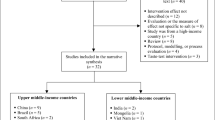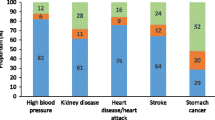Abstract
Purpose of Review
The purpose of this review was to examine the knowledge, attitudes and behaviours (KAB) related to dietary salt intake among adults in high-income countries.
Recent Findings
Overall (n = 24 studies across 12 countries), KAB related to dietary salt intake are low. While consumers are aware of the health implications of a high salt intake, fundamental knowledge regarding recommended dietary intake, primary food sources, and the relationship between salt and sodium is lacking. Salt added during cooking was more common than adding salt to food at the table. Many participants were confused by nutrition information panels, but food purchasing behaviours were positively influenced by front of package labelling.
Summary
Greater emphasis of individual KAB is required from future sodium reduction programmes with specific initiatives focusing on consumer education and awareness raising. By doing so, consumers will be adequately informed and empowered to make healthier food choices and reduce individual sodium intake.

Similar content being viewed by others
References
Papers of particular interest, published recently, have been highlighted as: •• Of major importance
World Health Organisation. Global status report on non-communicable diseases. Geneva: World Health Organisation; 2010.
Deckers IAG, van den Brandt PA, van Engeland M, Soetekouw PMMB, Baldewijns MMLL, Goldbohm RA, et al. Long-term dietary sodium, potassium and fluid intake; exploring potential novel risk factors for renal cell cancer in the Netherlands Cohort Study on diet and cancer. Br J Cancer. 2014;110:797–801.
D’Elia L, Rossi G, Ippolito R, Cappuccio FP, Strazzullo P. Habitual salt intake and risk of gastric cancer: a meta-analysis of prospective studies. Clin Nutr. 2012;31:489–98.
He FJ, Jenner KH, MacGregor GA. WASH-world action on salt and health. Kidney Int. 2010;78:745–53.
World Health Organisation. Guideline sodium intake for adults and children sodium intake for adults and children. Geneva: World Health Organisation; 2012.
Powles J, Fahimi S, Micha R, Khatibzadeh S, Shi P, Ezzati M, et al. Global, regional and national sodium intakes in 1990 and 2010: a systematic analysis of 24 h urinary sodium excretion and dietary surveys worldwide. BMJ Open. 2013;3:e003733. https://doi.org/10.1136/bmjopen-2013-003733.
World Health Organisation. Global action plan for the prevention and control of noncommunicable disease 2013–2020. Geneva: World Health Organisation; 2013.
•• World Health Organisation. The SHAKE technical package for salt reduction. Geneva: World Health Organisation; 2016. Strategy for the design and implementation of sodium reduction programmes.
•• Trieu K, Neal B, Hawkes C, et al. Salt reduction initiatives around the world—a systematic review of progress towards the global target. PLoS One. 2015;10:e0130247. Systematic review of the global progress of sodium reduction programmes.
Charlton KE, Langford K, Kaldor J. Innovative and collaborative strategies to reduce population-wide sodium intake. Curr Nutr Rep. 2015;4:279–89.
Charlton K, Webster J, Kowal P. To legislate or not to legislate? A comparison of the UK and South African approaches to the development and implementation of salt reduction programs. Nutrients. 2014;6:3672–95.
Brown IJ, Tzoulaki I, Candeias V, Elliott P. Salt intakes around the world: implications for public health. Int J Epidemiol. 2009;38:791–813.
Johnson C, Santos JA, McKenzie B, Thout SR, Trieu K, McLean R, et al. The science of salt: a regularly updated systematic review of the implementation of salt reduction interventions (September 2016–February 2017). J Clin Hypertens. 2017;19:928–38.
Webster JL, Dunford EK, Hawkes C, Neal BC. Salt reduction initiatives around the world. J Hypertens. 2011;29:1043–50.
World Health Organisation. WHO Creating an enabling environment for population-based salt reduction strategies: report of a joint technical meeting. Geneva: World Health Organisation; 2010.
Bettinghaus EP. Health promotion and the knowledge-attitude-behavior continuum. Prev Med. 1986;15:475–91.
Worsley A. Nutrition knowledge and food consumption: can nutrition knowledge change food behaviour? Asia Pac J Clin Nutr. 2002;11:579–85.
Sarmugam R, Worsley A, Flood V. Development and validation of a salt knowledge questionnaire. Public Health Nutr. 2013;17:1061–8.
Higgins J, Green S. Cochrane handbook for systematic reviews of interventions version 5.1.0 [updated march 2011]. The Cochrane Collaboration. 2011.
The World Bank. New country classifications by income level: 2018–2019|the data blog. In: World Bank. 2018. http://blogs.worldbank.org/opendata/new-country-classifications-income-level-2018-2019. Accessed 13 Jul 2018.
Arcand JA, Mendoza J, Qi Y, Henson S, Lou W, L’Abbe MR. Results of a national survey examining Canadians’ concern, actions, barriers, and support for dietary sodium reduction interventions. Can J Cardiol. 2013;29:628–31.
Charlton K, Yeatman H, Houweling F, Guenon S. Urinary sodium excretion, dietary sources of sodium intake and knowledge and practices around salt use in a group of healthy Australian women. Aust N Z J Public Health. 2010;34:356–63.
Claro RM, Linders H, Ricardo CZ, Legetic B, Campbell NRC, Moreira Claro R, et al. Consumer attitudes, knowledge, and behavior related to salt consumption in sentinel countries of the Americas. Rev Panam Salud Publica. 2012;32:265–73.
Dewey G, Wickramasekaran RN, Kuo T, Robles B. Does sodium knowledge affect dietary choices and health behaviors? Results from a survey of Los Angeles County residents. Prev Chronic Dis. 2017; https://doi.org/10.5888/pcd14.170117.
Grimes CA, Riddell LJ, Nowson CA. Consumer knowledge and attitudes to salt intake and labelled salt information. Appetite. 2009;53:189–94.
Grimes CA, Riddell L, Nowson CA. The use of table and cooking salt in a sample of Australian adults. Asia Pac J Clin Nutr. 2010;19:256–60.
Grimes CA, Kelley S-J, Stanley S, Bolam B, Webster J, Khokhar D, et al. Knowledge, attitudes and behaviours related to dietary salt among adults in the state of Victoria, Australia 2015. BMC Public Health. 2017;17:532.
Khokhar D, Nowson CA, Grimes CA. Knowledge and attitudes are related to selected salt-specific behaviours among Australian parents. Nutrients. 2018; https://doi.org/10.3390/nu10060720.
Harris R, Rose A, Unwin N. The Barbados national salt study: findings from a health of the nation sub-study 37; 2015.
Kim MK, Lopetcharat K, Gerard PD, Drake MA. Consumer awareness of salt and sodium reduction and sodium labeling. J Food Sci. 2012;77:S307–13.
Kim MK, Lee KG. Consumer awareness and interest toward sodium reduction trends in Korea. J Food Sci. 2014;79:S1416–23.
Land M-A, Webster J, Christoforou A, Johnson C, Trevena H, Hodgins F, et al. The association of knowledge, attitudes and behaviours related to salt with 24-hour urinary sodium excretion. Int J Behav Nutr Phys Act. 2014;11(47):47.
Levings JL, Maalouf J, Tong X, Cogswell ME. Reported use and perceived understanding of sodium information on US nutrition labels. Prev Chronic Dis. 2015;12:E48.
Marakis G, Tsigarida E, Mila S, Panagiotakos DB. Knowledge, attitudes and behaviour of greek adults towards salt consumption: a Hellenic food authority project. Public Health Nutr. 2014;17:1877–93.
Marshall S, Bower JA, Schröder MJA. Consumer understanding of UK salt intake advice. Br Food J. 2007;109:233–45.
Odom EC, Whittick C, Tong X, John KA, Cogswell ME. Changes in consumer attitudes toward broad-based and environment-specific sodium policies-SummerStyles 2012 and 2015. Nutrients. 2017;9:836.
Papadakis S, Pipe AL, Moroz IA, Reid RD, Blanchard CM, Cote DF, et al. Knowledge, attitudes and behaviours related to dietary sodium among 35- to 50-year-old Ontario residents. Can J Cardiol. 2010;26:e164–9.
Patel D, Cogswell ME, John K, Creel S, Ayala C. Knowledge, attitudes, and behaviors related to sodium intake and reduction among adult consumers in the United States. Am J Health Promot. https://doi.org/10.4278/ajhp.150102-QUAN-650.
Pomerleau J, McKee M, Robertson A, Kadziauskiene K, Abaravicius A, Bartkeviciute R, et al. Dietary beliefs in the Baltic republics. Public Health Nutr. 2001;4:217–25.
Regan Á, Shan CL, Wall P, Mcconnon Á. Perspectives of the public on reducing population salt intake in Ireland. Public Health Nutr. 2015;19:1327–35.
Sarmugam R, Worsley A, Wang W. An examination of the mediating role of salt knowledge and beliefs on the relationship between socio-demographic factors and discretionary salt use: a cross-sectional study. Int J Behav Nutr Phys Act. 2013;10(25):25.
Vitale K, Paradinović S, Durić J, Dika Ž, Jurić D, Luketić P, et al. Knowledge, attitude and practice about salt intake in Croatian continental rural population. Agric Conspec Sci. 2012;77:151–6.
Webster JL, Li N, Dunford EK, Nowson CA, Neal BC. Consumer awareness and self-reported behaviours related to salt consumption in Australia. Asia Pac J Clin Nutr. 2010;19:550–4.
Welsh EM, Perveen G, Clayton P, Hedberg R. Sodium reduction in communities Shawnee County survey 2011: methods and baseline key findings. J Public Health Manag Pract. 2014;20:S9–15.
Wickramasekaran RN, Gase LN, Green G, Wood M, Kuo T. Consumer knowledge, attitudes, and behaviors of sodium intake and reduction strategies in Los Angeles County: results of an Internet panel survey (2014-2015). Calif J Health Promot. 2016;14:35–44.
Wyllie A, Moore R, Brown R. Salt consumer survey. 2011.
Land M-A, Webster J, Christoforou A, Praveen D, Jeffery P, Chalmers J, et al. Salt intake assessed by 24 h urinary sodium excretion in a random and opportunistic sample in Australia. BMJ Open. 2014;4:e003720.
Wyness LA, Butriss JL, Stanner SA. Reducing the population’s sodium intake: the UK Food Standards Agency’s salt reduction programme. Public Health Nutr. 2012;15:254–61.
McLean R, Hoek J. Sodium and nutrition labelling: a qualitative study exploring New Zealand consumers’ food purchasing behaviours. Public Health Nutr. 2014;17:1138–46.
FSA. Guide to creating a front of pack (FoP) nutrition label for pre-packed products sold through retail outlets. Food Stand Agency 27; 2013.
Ministry for Primary Industries. The health star rating (HSR) industry kit. 2015.
Government of Canada Food front-of-package nutrition symbol consumer consultation|healthy eating consultations. 2017. https://www.healthyeatingconsultations.ca/front-of-package. Accessed 9 Aug 2018.
Sarmugam R, Worsley A. Current levels of salt knowledge: a review of the literature. Nutrients. 2014;6:5534–59.
Mckenzie B, Santos JA, Trieu K, Thout SR, Johnson C, Arcand JA, et al. The science of salt: a focused review on salt-related knowledge, attitudes and behaviors, and gender differences. J Clin Hypertens. 2018;20:850–66.
Author information
Authors and Affiliations
Corresponding author
Ethics declarations
Conflict of Interest
Neela Bhana, Jennifer Utter, and Helen Eyles declare they have no conflict of interest.
Human and Animal Rights and Informed Consent
This article does not contain any studies with human or animal subjects performed by any of the authors.
Additional information
This article is part of the Topical Collection on Cardiovascular Disease
Electronic supplementary material
ESM 1
(DOCX 13 kb)
Rights and permissions
About this article
Cite this article
Bhana, N., Utter, J. & Eyles, H. Knowledge, Attitudes and Behaviours Related to Dietary Salt Intake in High-Income Countries: a Systematic Review. Curr Nutr Rep 7, 183–197 (2018). https://doi.org/10.1007/s13668-018-0239-9
Published:
Issue Date:
DOI: https://doi.org/10.1007/s13668-018-0239-9




